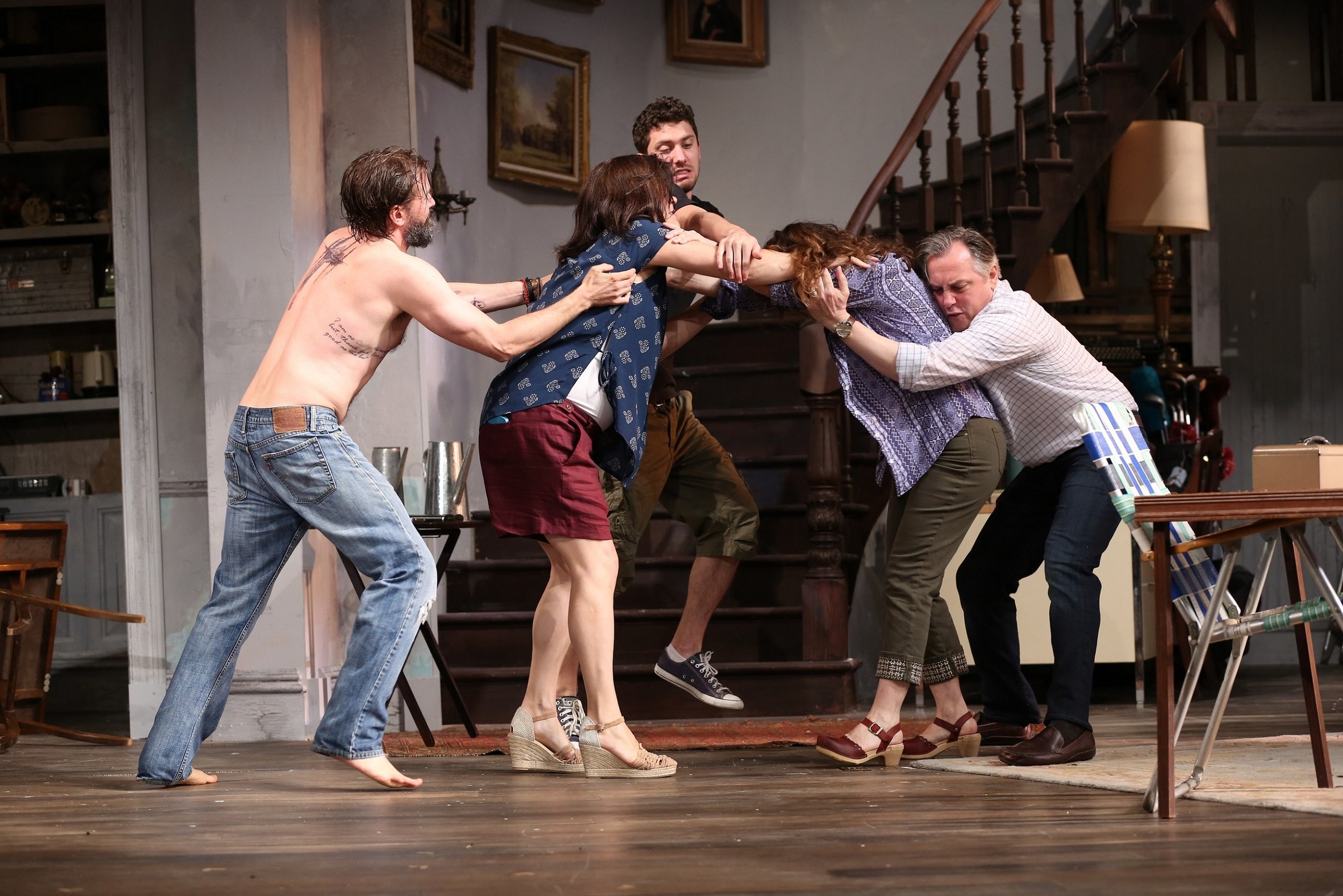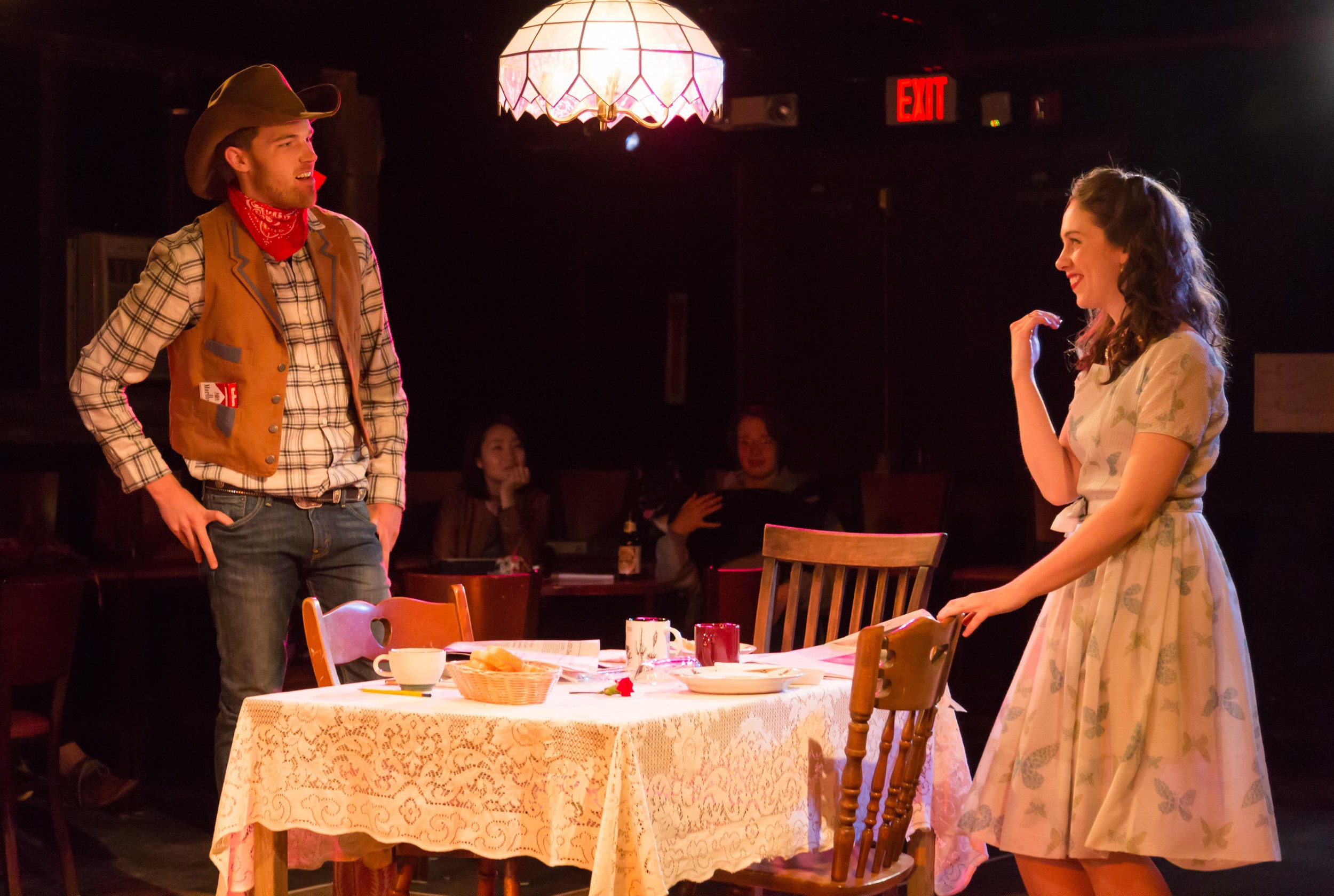Inappropriate Behavior
Review of Appropriate, Westport Country Playhouse
Branden Jacobs-Jenkins’ Obie-winning play Appropriate lets viewers choose where to place the stress in the title, and it also leaves to viewers how many big dysfunctional family dramas are “appropriate” to name as “appropriated” material. The playbill trots out everything from the most obvious, Tracy Letts’ August: Osage County and Sam Shepherd’s Buried Child, to some a bit of a stretch—Tennessee Williams’ Cat on a Hot Tin Roof, Chekhov’s The Cherry Orchard, and even Edward Albee’s Who’s Afraid of Virginia Woolf. That kind of “spot the antecedent” game seems to me a bit counter-productive. The play not mentioned that at least would serve some purpose as a thematic comparison is Ibsen’s Ghosts where the true nature of a patriarch and what that means to his offspring is very much to the point.
The patriarch in this case is a once well-heeled Washington lawyer recently deceased after twenty years of decrepitude. His children are gathered to dispose of his plantation in Arkansas, spookily moldering with a hoarder’s trash inside and, outside, separate graveyards for family members and slaves. We watch as estranged son Frank, now Franz (Shawn Fagan)—missing from the family for ten years—climbs in through a window with his free-spirit vegan girlfriend River (Anna Crivelli). Their presence sets off the eldest sibling, Toni (Betsy Aidem), who, as executrix and chief caregiver during their father’s long decline, is quite vocal in her sense of propriety and grievance. The middle sibling is Bo (David Aaron Baker), a typical New York pater with a fussy Jewish wife, Rachael (Diane Davis), and two kids—Cassie (Allison Winn), a thirteen-year-old who claims stridently that she’s “almost an adult,” and a boy, Ainsley (Christian Michael Camporin), who seems content to be a child. Toni’s son, Rhys (Nick Selting), a twenty-something, is also on hand to feel generally put upon by all the middle-aged Sturm und Drang on display among his elders.
Franz (Shawn Fagan), Rachael (Diane Davis), Rhys (Nick Selting), Toni (Betsy Aidem), Bo (David Aaron Baker) (photo: Carol Rosegg)
Andrew Boyce’s scenic design is stunning, letting us experience the space with these visitors and giving director David Kennedy a fully realized world for Jacobs-Jenkins’ characters, who are by terms abrasive, pathetic, amusing, and sympathetic, but never endearing.
River (Anna Crivelli), Franz (Shawn Fagan)
Franz claims to be seeking reconciliation; Toni clings to Rhys and generally undermines everyone else; Bo plays middle-man as if it’s his natural calling. Every role is filled superlatively, with special mention for Aidem’s bull-at-a-garage sale of a domineering but vulnerable sister, and for Baker’s harried decency as Bo. Crivelli plays River as comic but not a caricature, which helps a lot, and Davis does well finding the heart of Rachael, a character who seems determined to be superficial. Fagan’s Franz is almost likeable, though we suspect, as the play goes on, that Toni is not simply spiteful in her view of her little brother’s failings; his character is rewardingly mercurial. And director Kennedy gets perfectly modulated performances of youthful disaffect and awkwardness from Selting's Rhys and Winn's Cassie.
Toni (Betsy Aidem), Rhys (Nick Selting) (photo: Carol Rosegg)
The clarity of exposition is much to the point here and makes staying in place with this family a drama of well-timed revelations. Family dramas owe some of their popularity, no doubt, to the fact that all families have skeletons in the closet and harbor family members who often bring out the worst in each other. We look on with a level of complicity that is determinate for how much we get out of the cast’s exchanges, which can be almost sweet at times, and, at other times, full-bore hostile.
Jacobs-Jenkins, however, has more on his mind than who said what to whom and who neglected whom and who has gone off the rails—there’s drug abuse, alcoholism, seduction of a minor, drug dealing, antisemitism, and divorce, in the past, and job loss and marriage and new parenthood in the prospective future. But that’s all, as it were, window dressing to the big question nagging everyone, perhaps more than would actually be the case: what’s with the photo albums of African-American lynching victims preserved on a book case, and what’s with the jars that contain what seem to be body parts?
Appropriate makes us ask what reaction is appropriate to such discoveries. Much as we might wonder how we ourselves might handle evidence of such virulent racism in a loved one, we also realize that this family is being made to shoulder a legacy it can ill sustain. The script cunningly lets us see each character navigate, badly, the minefield of these artifacts’ existence. And Kennedy, whose direction of The Invisible Hand last season at Westport showed a similar skill with ethical gray areas, keeps things tense and probing. Neither director nor author shy away from showing us how the family dynamic—any family dynamic—is a means to shelter and exclude. Here, the excoriation the characters level at each other serves to highlight a more general social dysfunction that festers where they can’t quite get at it.
Rachael (Diane Davis), Bo (David Aaron Baker) (photo: Carol Rosegg)
Engaging enough thanks to its wonderful cast, set, and direction, Appropriate’s structure can feel a little flabby at times, particularly in a second act that gives the younger cast members stage time and lets the elders take a bit of a rest, but is a bit too relaxed and sit-com-like to maintain the play’s edge. But that weakness is more than made up for by Act Three. With its teasing black-outs—punctuated by deafening cicadas—striking special effects, explosive fight, sustained speeches from all the principle characters, scene-stopping intrusion by Ainsley, and quirky sense of roiling crisis, Appropriate’s finale delivers appropriate theatrical thrills.
Appropriate
By Branden Jacobs-Jenkins
Directed by David Kennedy
Scenic Design: Andrew Boyce; Costume Design: Emily Rebholz; Lighting Design: Matthew Richards; Sound Design: Fitz Patton; Fight Director: Michael Rossmy; Props Master: Alixon Mantilla; Production Dramaturg: Dana Tanner-Kennedy; Casting: Tara Rubin Casting, Laura Schutzel, CSA; Production Stage Manager: Geoff Boronda
Cast: Betsy Aidem, David Aaron Baker, Christian Michael Camporin, Anna Crivelli, Diane Davis, Shawn Fagan, Nick Selting, Allison Winn
Westport Country Playhouse
August 15-September 2, 2017

























